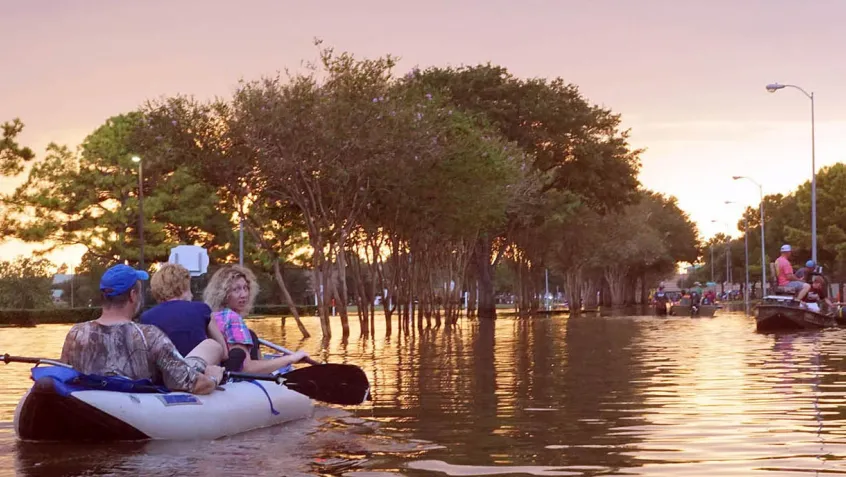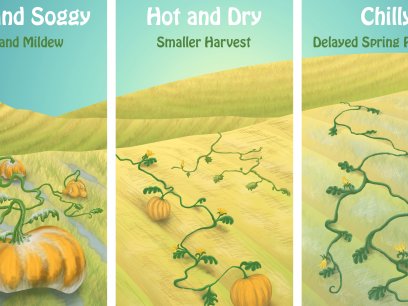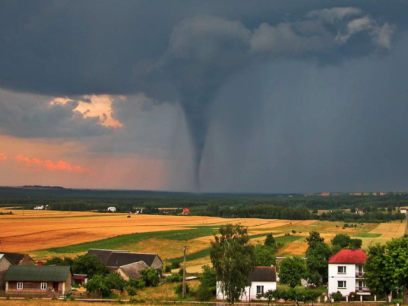
Climate change can seem like a distant problem, but it already poses health threats here and now. Some of them are easy to spot; we’ve all read headlines in the news about droughts, flooding, or wildfires.
Other issues are harder to see. Mental health can suffer as people struggle to cope with extreme weather events. Diseases can be spread farther by ticks and mosquitoes. Air quality can be reduced due to pollutants, allergens, or dust.
People are impacted by climate change in different ways. While some may not notice a difference in their health, others—children, pregnant women, the economically disadvantaged, or the socially isolated—are particularly vulnerable to the negative effects.
“Climate change’s impact on human health is multifaceted, and we are seeing its effects already,” said Vernessa Perry, the National Environmental Education Foundation’s (NEEF) Senior Program Director for Health & Wellness. “And while we are all at risk from the impacts of climate change, communities with existing health conditions are even more susceptible to problems.”
How Climate Change Impacts Human Health
The World Health Organization explains that climate change threatens the social and environmental foundations of good health:
- Clean air
- Safe drinking water
- Sufficient food
- Secure shelter
Between 2030 and 2050, climate change is expected to cause 250,000 additional deaths per year due to heat stress, malaria, malnutrition, and diarrhea.
Globally, children are estimated to bear the biggest burden of disease due to climate change. Pollutants and allergens can cause respiratory disease or make symptoms of existing conditions—like asthma, which more than five million children struggle with—worse.
For example, one of the most common environmental allergens is ragweed, which can cause hay fever and trigger asthma attacks. Since 1995, ragweed pollen season has grown longer at 10 of the 11 locations studied by the Environmental Protection Agency (EPA). In some regions, climate change brings pollen season earlier, extends the growing season, and leads plants to produce larger quantities of pollen. Smog and wildfire smoke can also expose children to dangerously low air quality.
These problems are already happening. But surveys show that many Americans don’t realize how climate change can impact their health. That’s why expanding public health education about managing environmental exposure due to climate change is so important.
Helping Health Care Providers Address Climate Change Challenges
To underscore the connection between climate change and public health, NEEF hosted a three-part online web series. The Children’s Environmental Health Series provided medical and public health professionals across the country with best practices to help them improve quality of care and provide clear guidance to minimize climate change’s negative impacts.
The virtual conference provided an in-depth examination of environmental health challenges that disproportionately impact at-risk populations, especially BIPOC communities, economically disadvantaged individuals, and those with a higher vulnerability to chronic health conditions.
The June 8 program featured a conversation with Dr. Regina Benjamin, 18th Surgeon General of the United States, and focused on answering an important question: how can healthcare providers achieve health equity by taking actionable steps to acknowledge and reduce racial health disparities?
Day two of the symposium explored the connection between climate change, air quality, and children’s asthma. The Centers for Disease Control and Prevention (CDC) aims to prevent 500,000 emergency department visits and hospitalizations due to asthma by 2024 through its Controlling Childhood Asthma and Reducing Emergencies (CCARE) objective. Participants will learn about evidence-based intervention through CDC’s EXHALE technical package.
The event concluded on June 22 with an important and timely session about ensuring the mental and physical health benefits of green spaces and public lands are available to all.
Take Action for Public Health
The challenge of addressing climate change starts with awareness. The future depends on decisions made today; now is the time to scale up efforts to protect public health.
“It is important for Americans to understand the wide-ranging implications of climate change. We can each make decisions that protect our health and the health of the planet,” Perry said.
Medical and public health professionals should review NEEF’s Pediatric Asthma Initiative for more information about asthma care and management, including a free eLearning course developed to help pediatric healthcare providers and clinicians manage environmental asthma triggers and intervention strategies.


